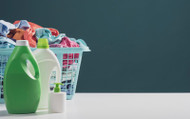Laundry is necessary in every household, but conventional laundry practices can have a significant environmental impact. Traditional laundry routines contribute to pollution and resource depletion, from excessive water consumption to chemical-laden detergents.
The good news is that embracing green laundry options can reduce your carbon footprint while leaving your clothes smelling fresh and clean. This article will explore sustainable laundry ideas that can make a difference in your home.
Order your versatile Nylon Laundry Bag today and keep your laundry organized in style!
Why Choose Eco-Friendly Laundry Practices?
Sustainable laundry options are good for the planet, your well-being, and your wallet. Traditional detergents use strong chemicals that can dry out your skin and contaminate waterways.
Further, washers and dryers use much water and electricity, raising bills. Using environment-friendly alternatives is the way forward, saving energy, eliminating waste, and creating a better living environment.
10 Eco-Friendly Laundry Solutions
Sustainable living starts at home, and one of the simplest ways to reduce your carbon footprint is by making your laundry routine more eco-friendly. Here are 10 eco-friendly laundry solutions to make your washing routine more sustainable.
1. Wash Clothes in Cold Water
Switching to cold water instead of hot water can save significant energy. Most of the energy used in laundry goes into heating the water, so cold water reduces electricity consumption and lowers utility bills. Additionally, cold water is gentler on fabrics, helping your clothes last longer.
How to Make This Change
-
Use cold water detergents that are designed for effective cleaning.
-
Sort laundry by color and pre-treat stains instead of relying on hot water for stain removal.
-
Select the "cold wash" setting on your washing machine.
2. Use Eco-Friendly Laundry Detergents
Conventional detergents contain abrasive chemicals, like phosphates, sulfates, and synthetic scents, which destroy aquatic ecosystems. Opt for biodegradable, nature-based detergents that have no toxins and are safe for the environment.
Best Eco-Friendly Detergent Options
-
Liquid or powder detergents are labeled as biodegradable.
-
Soap nuts are natural alternatives that contain saponin, a natural cleaning agent.
-
DIY laundry detergent using baking soda, washing soda, and Castile soap.
3. Reduce Microplastic Pollution with a Filter or Bag
Synthetic fabrics release microplastics during washing, which can harm marine life by entering waterways. To prevent this, use a microplastic filter or a washing bag to trap these tiny particles.
Best Ways to Prevent Microplastic Shedding
-
Use a Guppyfriend washing bag to catch microfibers from synthetic clothing.
-
Install a microfiber filter on your washing machine.
-
Wash synthetic fabrics less frequently and air them out instead.
4. Line Dry Clothes Instead of Using a Dryer
Tumble dryers consume a lot of energy, so air-drying your clothes is one of the most effective ways to reduce electricity use. Sunlight naturally disinfects and brightens clothes while reducing wear and tear caused by heat.
Tips for Effective Air Drying
-
Use a drying rack indoors if outdoor space is limited.
-
Hang clothes outside in the sun to naturally disinfect them.
-
Shake out and smooth clothes before drying to reduce wrinkles.
5. Choose an Energy-Efficient Washing Machine
When replacing your appliances, choose an Energy Star- certified washing machine. These machines are more water—and electricity-efficient than others and are sustainable for laundry.
What to Look for in an Energy-Efficient Washer
-
Front-loading machines use less water compared to top-loading ones.
-
High-efficiency (HE) models require less detergent and water.
-
Machines with eco-friendly wash cycles that adjust energy usage.
6. Wash Full Loads to Save Water and Energy
Tumble dryers use a lot of power, so air-drying clothes is one of the most effective ways to reduce electricity usage. It also reduces water and energy waste per garment and makes laundry more sustainable.
How to Optimize Load Size
-
Sort clothes efficiently so you can wash full loads without overloading.
-
Adjust the water level settings accordingly if you must do a small load.
-
Combine similar colors and fabric types to maximize load efficiency.
7. Use Wool Dryer Balls Instead of Dryer Sheets
Conventional dryer sheets contain synthetic fragrances and chemicals, contributing to indoor air pollution and landfill waste. Instead, use wool dryer balls, which reduce drying time, soften fabrics naturally, and are reusable for years.
Benefits of Wool Dryer Balls
-
Reduce static cling and wrinkles.
-
Shorten drying time by improving airflow.
-
It can be scented with essential oils for a natural fragrance.
8. Make DIY Fabric Softeners
Fabric softeners contain chemicals that coat clothes with a waxy residue. This residue can irritate the skin and pollute water systems. Instead, use natural alternatives like white vinegar, dryer balls, or baking soda to soften clothes and eliminate odors.
Simple DIY Fabric Softener Recipe
-
Mix 1 cup of white vinegar with a few drops of essential oil (like lavender or lemon).
-
Add the mixture to the fabric softener compartment of your washer.
-
Enjoy fresh, soft clothes without harmful chemicals.
9. Repurpose Old Clothes as Cleaning Rags
Avoid discarding old clothes; upcycle them into cleaning rags. This reduces textile waste and eliminates the need for disposable paper towels.
Ways to Reuse Old Clothing
-
Cut old T-shirts or towels into reusable rags.
-
Use them for dusting, wiping surfaces, and cleaning spills.
-
Donate usable clothing to charities instead of throwing them away.
10. Opt for Natural Stain Removers
Factory-made stain removers contain toxic chemicals that can damage your health and the environment. Use natural stain removal alternatives with household items instead.
Eco-Friendly Stain Removal Hacks
-
Baking soda – Great for absorbing grease and neutralizing odors.
-
Lemon juice – Naturally brightens and removes stains.
-
Hydrogen peroxide – Works as a gentle bleach alternative.
-
Salt and vinegar – Effective for wine and sweat stains.
Frequently Asked Questions
Do eco-friendly detergents work as well as traditional ones?
Absolutely! Many plant-based detergents are as effective and free from harsh chemicals that can damage fabrics over time.
How does washing in cold water help the environment?
Washing in cold water reduces energy consumption by eliminating the need to heat water, which helps lower carbon emissions and electricity usage.
Is vinegar safe for all types of fabrics?
Vinegar is safe for most fabrics, but don't use it on silk or wool since it can cause the fibers to weaken.
What are wool dryer balls, and how do they work?
Wool dryer balls are eco-friendly, reusable dryer sheet alternatives. They decrease drying time, soften clothes, and prevent static cling without chemicals.
Is line drying better than using a dryer?
Yes, line drying is better for the environment. It conserves energy, reduces electricity bills, and prolongs the lifespan of clothing.



